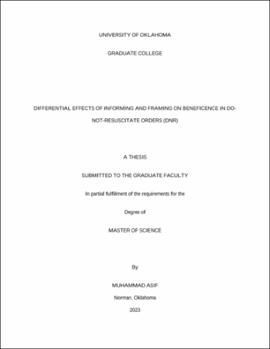| dc.contributor.advisor | Feltz, Adam | |
| dc.contributor.author | Asif, Muhammad | |
| dc.date.accessioned | 2023-07-26T13:28:58Z | |
| dc.date.available | 2023-07-26T13:28:58Z | |
| dc.date.issued | 2023-08-04 | |
| dc.identifier.uri | https://hdl.handle.net/11244/337953 | |
| dc.description.abstract | Empirical comparisons based on ethical standards have been neglected in end-of-life decision making research. I have compared two persuasion techniques (i.e., informing and framing) on whether they protect or promote beneficence. Experiment 1a (N = 225) suggested that people understand and feel about different DNR terminologies (CPR, AND & DNR) differently. Experiment 1b (N = 281) showed similar results to Experiment 1a and further suggested people different terminologies also affect people’s DNR preference. Experiment 1c (N = 415) suggested that informing predicted higher DNR preference and lower CPR preference while positive frame predicted higher CPR preference. Experiment 2 (N = 381) showed that informing protected beneficence in both CPR and DNR preference decisions context while framing (both positive and negative frames) also protected beneficence in CPR preference decision. Overall, the findings of this thesis suggest that different decision aid interventions could be compared based on ethical standards and that both informing and framing can protect beneficence in end-of-life decision making context. | en_US |
| dc.language | en_US | en_US |
| dc.subject | beneficence | en_US |
| dc.subject | end-of-life values | en_US |
| dc.subject | Do-Not-Resuscitate Order (DNR) | en_US |
| dc.subject | persuasion techniques | en_US |
| dc.title | Differential Effects of Informing and Framing on Beneficence in Do-Not-Resuscitate Order (DNR) | en_US |
| dc.contributor.committeeMember | Cokely, Edward | |
| dc.contributor.committeeMember | Gronlund, Scott | |
| dc.date.manuscript | 2023-05-31 | |
| dc.thesis.degree | Master of Science | en_US |
| ou.group | Dodge Family College of Arts and Sciences::Department of Psychology | en_US |
